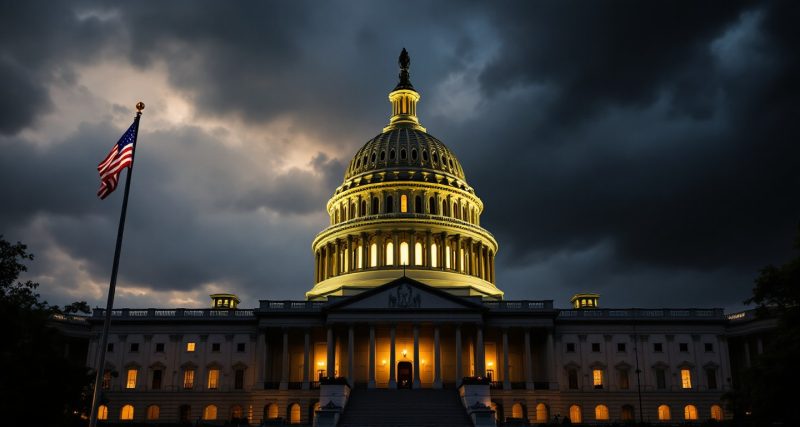The Anatomy of a Republican Rebellion: How Fiscal Hawks and a Credit Downgrade Shook Washington

The Showdown That Wasn’t Supposed to Happen
It was supposed to be a victory lap for President Trump and House Speaker Mike Johnson.
A “big, beautiful bill” that would extend Trump’s signature 2017 tax cuts, slash taxes on tips and overtime, and pour billions into defense and border security. Instead, Friday’s House Budget Committee session turned into a political spectacle, with five Republican hardliners joining Democrats to block the bill and send the GOP’s legislative agenda into a tailspin. Hours later, Moody’s delivered a gut punch: the U.S. was losing its last perfect AAA credit rating, citing ballooning deficits and a lack of political will to fix them.
I’ve covered plenty of budget battles, but the mood in Washington this weekend felt different—more like a family feud than a policy debate. The stakes? Not just the fate of a tax bill, but the country’s financial reputation and the future of the Republican Party itself.
The Bill That Broke the Party
Let’s be clear: this wasn’t just any bill. The “One Big Beautiful Bill Act” was a sprawling package, promising tax relief for working Americans, a repeal of taxes on firearm silencers, and a crackdown on illegal immigration. But for the House Freedom Caucus and other fiscal hawks, it didn’t go nearly far enough. They wanted deeper cuts to Medicaid, an immediate start to work requirements, and a full repeal of green energy tax credits—provisions that moderates from swing districts warned could cost the GOP its slim House majority in 2026.
Rep. Chip Roy, one of the dissenters, summed up the hardliners’ position with a blunt warning: “We are writing checks we cannot cash, and our children are going to pay the price. So, I am a ‘no’ on this bill unless serious reforms are made”.
The committee’s chairman, Rep. Jodey Arrington, tried to keep the peace, scheduling a rare Sunday night session to try again. But the damage was done. Trump, never one to mince words, blasted the “grandstanders” in his own party on social media, urging Republicans to “UNITE” and “STOP TALKING, AND GET IT DONE!”.
Moody’s Delivers a Wake-Up Call
As the GOP scrambled to regroup, Moody’s Investors Service delivered a verdict that echoed through Wall Street and Main Street alike: the U.S. was no longer a AAA nation. The agency cited “large annual fiscal deficits and growing interest costs,” warning that the debt could hit 134% of GDP by 2035, up from 98% in 2024. The downgrade, Moody’s said, was a direct result of Washington’s chronic inability to rein in spending or agree on meaningful reforms.
For context, the U.S. had been the last major economy to hold onto a perfect credit rating from all three agencies. Standard & Poor’s downgraded the U.S. in 2011, Fitch followed in 2023, and now Moody’s has joined the chorus. The symbolism is hard to miss: America’s political dysfunction is now a global financial liability.
The Human Cost and the Political Calculus
The numbers are staggering. The Congressional Joint Tax Committee estimates the bill would cost $3.72 trillion over a decade. The Congressional Budget Office confirmed it would stay under a $4.5 trillion cap, but critics argue that’s cold comfort with the national debt already at $36.2 trillion.
Democrats, for their part, called the bill a “massive giveaway to billionaires,” warning that proposed Medicaid and Affordable Care Act cuts could leave 8.6 million Americans without health insurance. “No other previous bill, no other previous law, no other previous event caused so many millions of Americans to lose their health care—not even the Great Depression,” said Rep. Brendan Boyle, the committee’s top Democrat.
What Happens Next?
The House Budget Committee is set to reconvene Sunday night, with both sides digging in. Hardliners want more cuts, moderates want to protect social programs, and Trump wants a win—fast. The outcome will shape not just the 2026 midterms, but the very credibility of the U.S. government in the eyes of the world.
As I walked past the Capitol Friday evening, the building glowed against a stormy sky—a fitting metaphor for a Congress caught between its ambitions and its anxieties. One staffer, clutching a stack of budget printouts, muttered, “We’re supposed to be the adults in the room. But right now, it feels like nobody’s in charge.”
If there’s a lesson here, it’s that America’s fiscal reckoning isn’t coming—it’s already arrived. The only question is whether anyone in Washington is willing to pay the bill.
